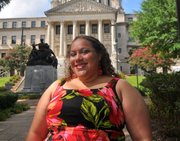Wednesday, September 4, 2013
As I commemorated the 50th anniversary of the March on Washington, I thought about the Dr. Martin Luther King Jr. we rarely hear about. We have allowed people to define King with one speech: "I Have a Dream."
The speech was important and powerful. When I was a young girl, I copied the whole speech and carried it every day. But Dr. King issued many challenges to Americans that we remain silent about. In a lesser-known speech, "Remaining Awake Through a Great Revolution," King said it was time to develop a world perspective, stating: "The world in which we live is geographically one. The challenge that we face today is to make it one in terms of brotherhood."
Instead of the warm, fuzzy, let's-all-hold-hands-and-everything-will-be-fine Dr. King that some have led us to believe existed, he understood that racism is complex and woven into our nation's fabric.
"It is an unhappy truth that racism is a way of life for the vast majority of white Americans, spoken and unspoken, acknowledged and denied, subtle and sometimes not so subtle—the disease of racism permeates and poisons a whole body politic," King said. "And I can see nothing more urgent than for America to work passionately and unrelentingly—to get rid of the disease of racism."
This is the same speech in which he famously called Sunday mornings "the most segregated hour" in America. That hasn't changed much.
King also spoke about the myths around race and race relations that are hindering our progress. The first myth he called out is still with us, too: "One is the myth of time. It is the notion that only time can solve the problem of racial injustice. And there are those who often sincerely say to the Negro and his allies in the white community, 'Why don't you slow up? Stop pushing things so fast. Only time can solve the problem. And if you will just be nice and patient and continue to pray, in 100 or 200 years, the problem will work itself out.'"
One moment in time should never define someone. Many prefer Dr. King, the dreamer. People don't want to know about the Poor People's Campaign that he was working on when he was assassinated or his anti-war views. The American public doesn't want to hear any so-called radical or militant words from a black leader they have decided is "safe" on race relations, so Dr. King's message has to be edited, refined and repackaged for easy mass consumption.
It's OK to have a dream—just make sure you're awake for the revolution.

Comments
justjess 10 years, 8 months ago
@Trip Burnes
"One moment in time should never define someone. Many prefer Dr. King, the dreamer. People don't want to know about the Poor people's Campaign that he was working on when he was assassinated or his anti-war views. The American public doesn't want to hear any so-called radical or militant words from a black leader they have decided is "safe" on race relations, so Dr. King's message has to be edited, refined and repackaged for easy mass consumption."
You make some great points; however, I think that we must be clear on the fact that Dr. King was not a militant or for that matter, he was not radical. Had Dr. King been "militant/radical, he would have been armed with something other than a Bible. I had the opportunity of meeting with Dr. King and attended mass meething with Lawrence Gyout and others who made sure that we remainded peaceful and non-violent during sit-ins and marches.
I agree that Dr. King lived in the NOW . He was a sensible man who knew that fair wages, decent working conditions, the end to Jim Crow laws, segregated schools - buses, lunch counters, medical waiting rooms, bathrooms, water fountains and the list goes go, would not be accomplished over night.
The "I Have A Dream" speech was, in my opinion, the prayer of a tired and wounded soldier. In other words, these things had not become actualized, but, he could visualize a post-racial era where all men, women and children are treated as equals.
"Warm and fuzzy" are not bad feelings; For me, they represent people who are thinking with their heart and allowing their minds to follow. I have met many whites who have expressed these feelings and also regret for the racist sins of others. These are the hands that we much continue to hold and the minds that will change as a result of it.
The Movement must remain non-violent!
multiculturegirl37 10 years, 4 months ago
I'm super late reading your comment. First someone can have radical ideas and be none violent. My piece said "so called radical or militant views" because people are resistant to hearing about King outside of the context of this speech and perhaps a march or two.
If was actually Mr. Guyot and other veterans of the Mississippi Civil rights movement who helped me reframe my view of King and the civil rights struggle in general. Having met them and spoke to them changed my life and my work.
It is indeed radical to be able to see a world free of segregation when it is all you have ever known. In no part of my piece did I advocate violence. Nor did I say "warm and fuzzy" was bad instead i am challenging people to push themselves further than just simplistic views of a man with a complex vision who understood race relations were complex.
Laurie Bertram Roberts
Sign in to comment
Or login with:
OpenID